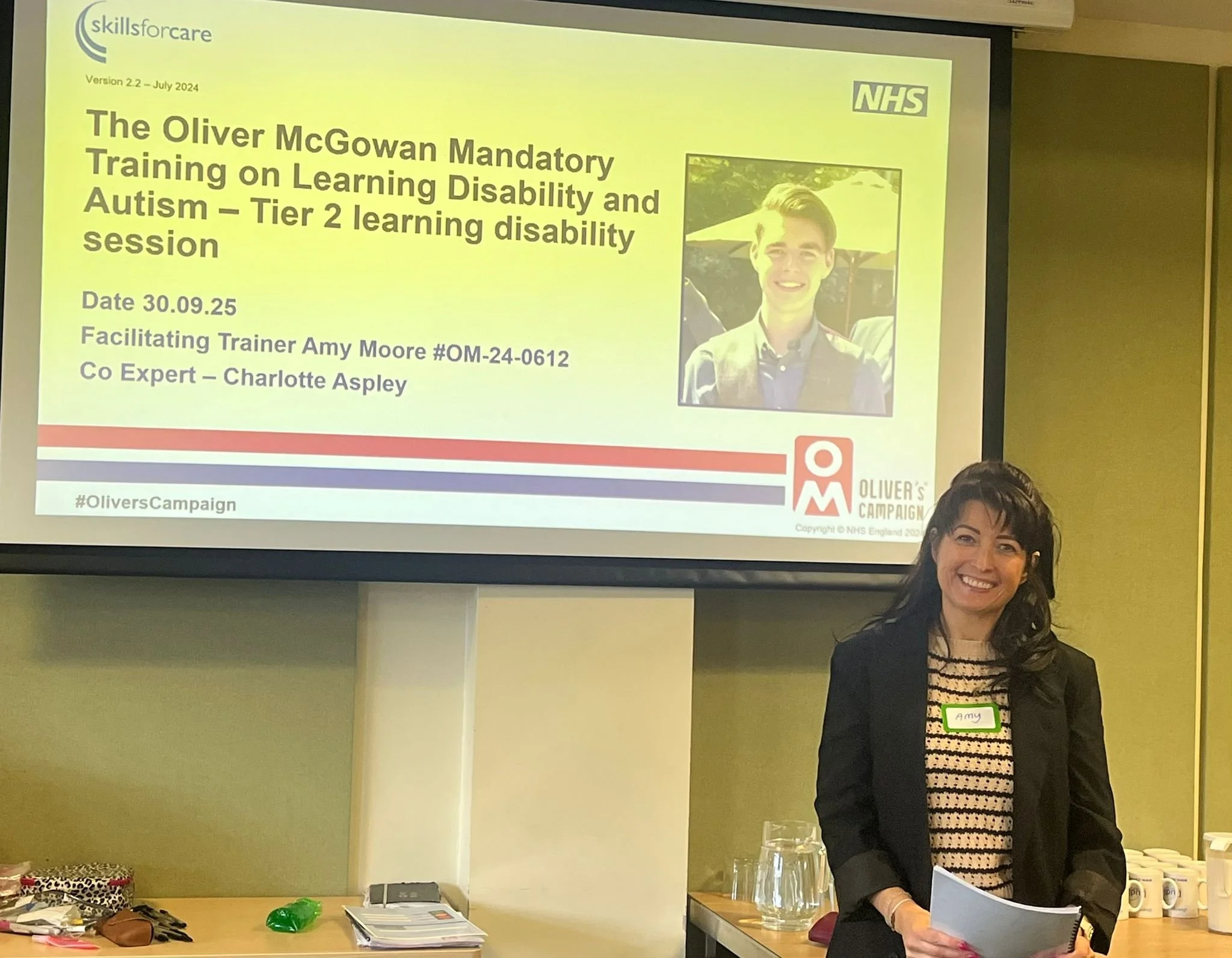
Our Training
Neurodiversity training delivered by neurodivergent people
Oliver McGowan Mandatory Training
The Health and Care Act 2022 introduced a statutory requirement that regulated service providers ensure their staff receive learning disability and autism training appropriate to their role.
The Oliver McGowan Mandatory Training is this standardised training.
As approved trainers, we can train your organisation so that they meet the Core Capabilities Frameworks on Autism and Learning Disability.
In-person or online
Max Number of Delegates: 30
Duration: 9:30 - 4:00
Autism & Eating Difficulties
Food and eating can be a huge issue for autistic people. Sensory issues and anxiety can lead to a person having a very restricted diet.
Delivered as either a 1 or 2 hour session, we'll learn all about autism and eating difficulties.
Covering:
Sensory sensitivities and their role in eating
Anxiety’s role in eating
Eating Disorders
Strategies that help
What is Sensory Processing?
When we hear about autism, we tend to hear about empathy, social struggles, and communication difficulties. But that's only a small part of the story & it hides that many of these difficulties actually stem from somewhere else: sensory needs.
In this session we cover:
what sensory processing is
what senses we have
what we can do to adapt the environment
Individual Sensory Sessions
If you need more than an introduction or want a session on any particular sense we can cover:
Touch, Hearing, Sight, Smell & Taste
Vestibular, Proprioception & Physical Behaviours
Interoception (sleep, hunger, bowels, and thirst)
We offer these as stand alone or as part of a full day course or 5 online webinars.
Neurodiversity in the Workplace
Want your staff to understand neurodiversity and know how to work together better? This is a great first step to making a more neuro-inclusive workplace.
Covering:
what neurodiversity is
the types of neurodivergence
practical changes you can make in the workplace to support staff
Neurodiversity Awareness
Confused on what neurodiversity is and how to support neurodivergent service users? This session is for you.
Covering:
what neurodiversity is
the types of neurodivergence
practical changes you can use to support people.
What is Autism?
An overview of our modern understanding of autism.
Covering:
what autism is
communication & interaction
the desire for structure and familiarity
sensory processing
what approaches support autistic people in everyday life
Autism & Mental Health
A deeper dive into autism and the mental health conditions that can occur with it. This session contains information about difficult subjects such as suicide.
Autism & Associated Conditions
Autistic people often share certain life experiences and genetics that lead us to be more at risk of certain conditions.
Such as:
Neurodivergence
Trauma
Difficulties with Emotional Processing
Demand Avoidance
Mental & Physical Health Conditions
Autism & LGBTQIA+ Identities
A webinar exploring LGBTQIA+ identities within the Autistic community.
Covering:
what different labels mean
why people might identify with them.
gender and sexuality
how to support LGBTQIA+ Autistic people
The session is great for both friends and family of autistic people and the professionals who work with them who want to gain a better understanding of their clients.
Autism in Women & Girls
In this session we will explore why autistic women and girls may look different to what we are told to look for.
We’ll cover:
How at school an autistic girl may be very polite, high achieving, but incredibly anxious
Why she might have many friends but struggle outside of her social circle
How her autism might be hidden
The impact puberty and periods can have on her from a sensory slide.
Autism vs ADHD
In this session we explain the differences and similarities between both ADHD and autism, and what it’s like to be both..
We also deliver this session as a one-hour introduction at larger events and conferences.
Autism, ADHD & Executive Functioning
Here we'll learn all about the executive functioning model of processing differences and look at:
Memory
Emotional Control
Impulse Control
Flexible Thinking
Self Monitoring
Organisation & Planning
Task Initiation
Prioritising
Autism, ADHD & Physical Behaviours
In this session we explain why we see physical behaviours in autistic and ADHD children and learn about:
Proprioception
Restlessness
Anxiety
Agitation, Irritation, Frustration
Aggression
Hitting & Biting
Recklessness
Screaming
Increased Stimming
ADHD in Women & Girls
Although autistic women and girls have the same 'ADHD' as their male counterparts, their traits may look different to what we are told to look out for.
Here we'll learn all about ADHD women and girls.
Covering:
What ADHD is
Why ADHD girls are missed
Masking
Rejection Sensitive Dysphoria
Pregnancy, Menopause & Puberty
Bespoking
Any of our sessions can be tailored and all include personal perspectives from those with lived experience and well as up to date information from the latest research.
We’ve worked with:
transporting bodies
travel companies
suicide prevention staff
NHS and social care staff
Commissioners
Mental Health Teams
Politicians
International organisations
and many more.























